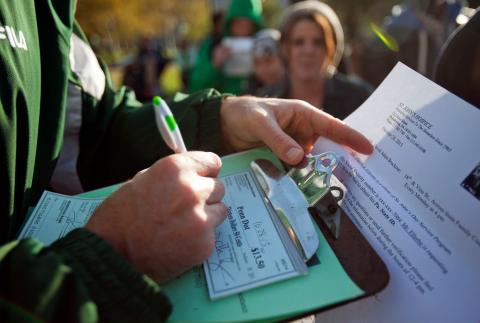In a strongly worded decision, a state judge on Friday struck down Pennsylvania’s 2012 law requiring voters to produce a state-approved photo ID at the polls, setting up a potential Supreme Court confrontation that could have implications for other such laws across the country.
The judge, Bernard L. McGinley of Commonwealth Court, ruled that the law hampered the ability of hundreds of thousands of Pennsylvanians to cast their ballots, with the burden falling most heavily on elderly, disabled and low-income residents, and that the state’s reason for the law — that it was needed to combat voter fraud — was not supported by the facts.
“Voting laws are designed to assure a free and fair election,” the judge wrote in his 103-page decision. “The voter ID law does not further this goal.”
In addition, Judge McGinley ruled, the state’s $5 million campaign to explain the law had been full of misinformation that has never been corrected. He also said that the free IDs that were supposed to be made available to those without driver’s licenses or other approved photo identification were difficult and sometimes impossible to obtain.
Opponents of voter IDs called the ruling a “devastating indictment” of the Pennsylvania law.
The case is now expected to go to the State Supreme Court. Attorney General Kathleen Kane said in a statement Friday that she was awaiting instructions from the governor about how to proceed.
James Schultz, the governor’s general counsel, said the state was studying the ruling. “We continue to evaluate the opinion and will shortly determine whether post-trial motions are appropriate,” he said. It was also unclear whether, if there is an appeal, the high court would be able to rule in time to allow the law to take effect for May’s primary.
As in other states that have passed similar voter ID laws in recent years, Pennsylvania’s law was spearheaded by Republican legislators and signed by a Republican governor, in Pennsylvania’s case without any Democratic legislative support. Judge McGinley is a Democrat.
Supporters of the law — which is intended to combat one type of potential fraud, that of unqualified people trying to vote in person — have said it is needed to make sure the person who casts the ballot is the person who is registered to vote.
Opponents contend that such fraud is rare — in Pennsylvania’s case, the state could not point to a single incident — and that the laws were intended to suppress Democratic turnout, since those who do not possess a state-approved photo ID are more likely to be in groups that tend to vote Democratic.
“The type of problem that is addressed by voter ID laws is virtually nonexistent, which does raise the question of why they are passing these laws,” Witold Walczak, legal director of the A.C.L.U. of Pennsylvania, said after Friday’s ruling. “And the answer is that it is a voter suppression tool.”
Proponents of voter ID laws, which are being challenged across the country, had pointed to a 2008 United States Supreme Court decision that upheld Indiana’s voter ID law, many of whose provisions are similar to Pennsylvania’s. That case, though, had been fought in federal courts. Pennsylvania’s case was in state court.
Wendy R. Weiser, director of the Democracy Program at the Brennan Center for Justice at New York University, said the two cases also differed in the facts that were considered. The Indiana case involved a law that had not yet been implemented, while the Pennsylvania case was able to point to the actual impact of the initial rollout of the law, particularly the ability of voters to get the free, state-issued photo IDs.
“The court really looked at the actual impact of the law,” Ms. Weiser said. “Some of the past decisions have come without doing a real, close look at the impact. The issue is how they affect people in practice, not in theory. And in practice, it turns out that a significant number of people can’t get the photo ID they need.”
The opponents of Pennsylvania’s law said they felt the decision could have significant repercussions in similar lawsuits in other states, though they stressed that each state’s circumstances were different.
A 2012 court challenge to the Pennsylvania law ended with the State Supreme Court kicking it back to the lower court for a new trial, which culminated in Friday’s ruling. The earlier decision also blocked the law until the new trial could be concluded, and Friday’s ruling means that the law will never take effect unless the ruling is overturned.
The plaintiffs in the Pennsylvania case included several voters who believed they had been disenfranchised, as well as the N.A.A.C.P., the Pennsylvania League of Women Voters and Philadelphia’s Homeless Advocacy Project.
“We feel we are in a very good position to be able to defend this law when it goes before the Supreme Court,” Mr. Walczak said, “though it would be foolish to try to predict what the Supreme Court will do.”


Spread the word